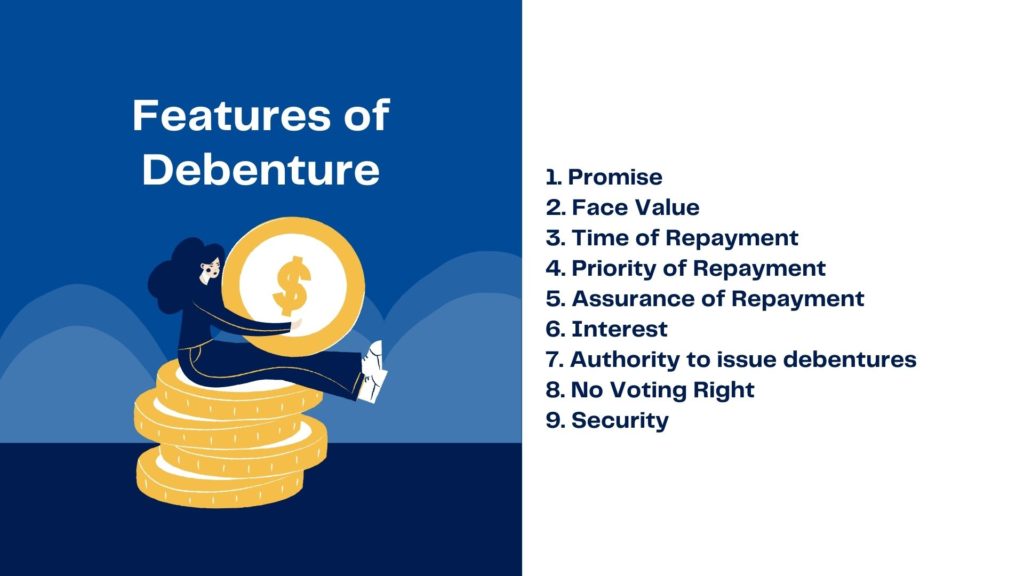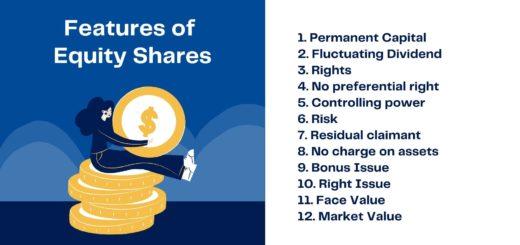Features of Debenture (9 Points) – Scholarszilla
Features of Debenture
What is Debenture?
Palmer defines: “A debenture as an instrument under seal evidencing debt, the essence of it being admission of indebtedness.”
Topham defines: “A debenture is a document given by a company as evidence of debt to the holder, usually arising out of loan, and most commonly secured by charge.”
According to the above definitions, debenture is an evidence of indebtedness. It is an instrument issued in the form of debenture certificate, under the company’s common seal.
- Public Deposit
- Global Depository Receipt (GDR)
- Features of Shares
- Meaning of Equity Shares
- Types of Debentures

Features of Debenture
1) Promise:
A debenture is a promise by a company that it owes specified sum of money to holder of the debenture.
2) Face Value:
The face value of debenture normally carries high denomination. It is 100 or in a multiple of 100.
3) Time of Repayment:
Debentures are issued with the due date stated in the debenture certificate. The principal amount of debenture is repaid on maturity date.
4) Priority of Repayment:
Debenture holders have a priority in repayment of debenture capital over the other claimants of company.
5) Assurance of Repayment:
Debenture constitutes a long term debt. They carry an assurance of repayment on due date.
6) Interest:
A fixed rate of interest is agreed upon and is paid periodically in case of debentures. Payment of interest is a fixed liability of the company. It must be paid by company irrespective of the fact, whether the company makes profit or not.
7) Parties to Debentures:
a) Company: This is the entity that borrows money.
b) Trustees: A company has to appoint Debenture Trustee if it is offering Debentures to more than 500 people. This is a part through whom the company deals with debenture holders. The company makes an agreement with trustees, it is known as Trust Deed. It contains the obligations of company, rights of debenture holders, powers of Trustee, etc.
c) Debentureholders: These are the parties who provide loan and receive, ‘Debenture Certificate’ as evidence.
8) Authority to issue debentures:
According to the Companies Act 2013, Section 179 (3), the Board of Directors has the power to issue debentures.
9) Status of Debentureholder:
The debenture holder is a creditor of the company. Since debenture is a loan taken by company, interest is payable on it at fixed rate, at fixed interval until the debenture is redeemed.
10) No Voting Right:
According to Section 71 (2) of the Companies Act 2013, no company shall issue any debentures carrying any voting right. Debenture holders have no right to vote at general meeting of the company.
11) Security:
Debentures are generally secured by a fixed or floating charge on company assets. Suppose a company is not in a position to make payment of interest or repayment of capital. In that case, the debenture holder can sell off charged property of the company and recover their money.
12) Issuers:
Debentures can be issued by both private company and public limited company.
13) Listing:
Debentures must be listed with at least one recognised stock exchange.
14) Transferability:
Debentures can be easily transferred, through the instrument of transfer.
Learn the chapters on TYBCOM from our YouTube channel.


